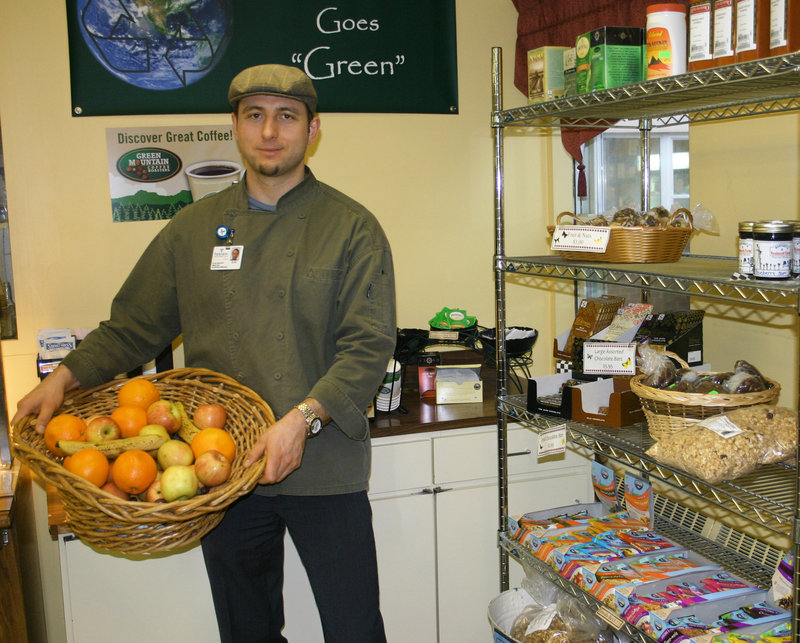To say hospital food has a bad reputation would be an understatement. The gravy-covered mystery meat, fake mashed potatoes and green Jell-O tend to rival airplane food in universal scorn.
The irony of health care institutions serving overcooked, highly processed, meat-based meals makes hospital fare an easy target for public health crusaders and stand-up comics.
For me, the unfortunate disconnect that can separate the medical profession from the significant role diet plays in health came into sharp view when I lived in Chapel Hill, N.C., where the university’s major teaching hospital was home to a Wendy’s franchise. Common sense finally prevailed when the hospital let the chain’s lease expire in 2008. (I guess I wasn’t the only one wondering if serving up fast food was a not-so-subtle strategy to get more business for the hospital’s cardiac ward.)
However, in this bland, greasy wasteland of institutional food, bright spots do exist. Here in Maine, a shining example can be found at Parkview Adventist Medical Center in Brunswick.
In the hospital’s cafe, which is open to staff and visitors, the menu is 100 percent vegetarian, roughly 70 percent organic and locally sourced whenever possible (with some of the vegetables coming from the hospital’s own garden). Products that contain high fructose corn syrup, hydrogenated oils or genetically modified ingredients are avoided. If employees get hungry between meals, they can grab free fresh fruit and bottled water from the cafe.
“The idea is, we’re the hospital and we should set an example of promoting health,” said Chef Oleg Opalnyk, Parkview’s head of nutritional services.
The hospital is affiliated with the Seventh-day Adventist church, and this view fits with the religion’s emphasis on health and wellness and the vegetarian diet maintained by some of its members.
The hospital’s menu for patients does include some non-vegetarian options — a nod to the older clientele and their meat-and-potatoes tastebuds — but it also offers a number of plant-based meals. And the meat options tend to be higher quality than what you’d find in a typical hospital, such as the organic, grass-fed beef Parkview uses to make hamburgers.
Opalnyk, who sticks to a vegetarian diet himself, grew up in the Ukraine and moved to Russia with his family when he was a teenager. He later studied at the Le Cordon Bleu College of Culinary Arts in Chicago. He’s traveled extensively, and said this influences his cooking style.
“To be vegetarian, you have to bring flavors and world spices to make your meal exciting,” Opalnyk said.
In addition to grab-and-go offerings such as salad, cut fruit, granola and vegan muffins, the cafe serves a variety of hot meals. These can include udon noodles with roasted shiitake mushrooms and ginger; rice with plantains, lime and cilantro; ratatouille with vegan cashew cream sauce; and sweet potato, smoked paprika and cannellini bean soup.
“I don’t use recipes,” Opalnyk said. “Sometimes I don’t repeat myself twice.”
Opalnyk noted that it takes greater skill to cook decent vegetarian grub than it does to throw a steak on the grill or a chicken breast in the oven.
“It’s much easier to cook non-vegetarian food,” Opalnyk said. “With vegetarian food, you need to be more creative and use more ingredients.”
To help others appreciate the full potential of plant-based cuisine, Opalnyk teaches cooking classes as part of Parkview’s Lifestyle Choices program. The two-week series shows patients with heart disease, diabetes and excess weight how exercise and diet can reverse these chronic diseases and reduce pharmaceutical drug use.
“We put them on my three-meal-a-day, vegan, whole grain, no sugar, limited salt and olive oil meals,” Opalnyk said.
The results are pretty impressive. At the start of the program, each participant is weighed and his blood is tested. the end of two weeks, the typical patient sees a 50 point drop in cholesterol and a 7-pound reduction in weight.
The class has proven popular, and the one that started this past weekend was oversubscribed before it started, with 60 registrants, a standing-room only crowd and a long list of others hoping to get in. Another class starts in the fall.
In his lessons, Opalnyk provides basic instruction in vegetarian food preparation and seasoning.
“If you start eating plain tofu, it’s disgusting,” Opalnyk said. Instead, it should be marinaded and then cooked.
With vegetables, he said, “there’s a healthy way to flavor them instead of just putting on a lot of butter.”
This involves both proper cooking techniques and a liberal hand with herbs and spices.
And when it comes to preconceived notions about plant-based meals, Opalnyk said, “There’s more to vegetarian food than just pasta.”
Staff Writer Avery Yale Kamila can be contacted at 791-6297 or at: akamila@pressherald.com
Send questions/comments to the editors.



Success. Please wait for the page to reload. If the page does not reload within 5 seconds, please refresh the page.
Enter your email and password to access comments.
Hi, to comment on stories you must . This profile is in addition to your subscription and website login.
Already have a commenting profile? .
Invalid username/password.
Please check your email to confirm and complete your registration.
Only subscribers are eligible to post comments. Please subscribe or login first for digital access. Here’s why.
Use the form below to reset your password. When you've submitted your account email, we will send an email with a reset code.